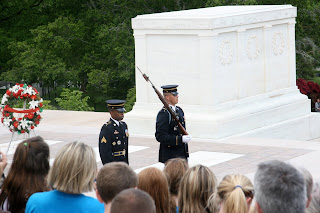"What we feel in our hearts, we need to express."
Cemeteries have always been a dreaded place for me. The reason is probably obvious and not uncommon: on the rare occasions that I visit them (usually during a funeral service), I am there to acknowledge the loss of someone I knew.
If I am visiting a grave site of a loved one to whom I was particularly close, I am there to mourn their absence in my life, or perhaps if I spin that around, I am there to recognize the value of their presence in my life as it was “then” and as it is “now.” Either way, that can be a painful thing, no matter how much time has passed.
So it is a bit odd for me to consider that on a recent visit to the Washington, D.C. area, the place that I spent the most time visiting was a cemetery.
I was in the area on business, but my husband had joined me so we could spend the weekend sightseeing and visiting family. Once my work obligations were completed, we set out to see what we could see.
The first place on our list was Arlington National Cemetery. Both of us had been there before, many years ago when we were younger and had little life experience through which to filter our understanding. This time, we came wearing the lens of adulthood.
Arlington National Cemetery draws some four million visitors each year, many of whom are there to say a final farewell to their loved ones. Others go to pay respects as American citizens (or visitors to the U.S.) with an appreciation for the history and sacrifice that saturates the green rolling landscape.
For me, perhaps it was because I have been researching memorialization and the ways we express our grief individually and collectively that I was more aware of my reactions to the monuments and other sacred spaces.
A trip to D.C. is bound to expose you to any number of “memorial” sites. In just a couple of days, we visited Memorials dedicated to President Lincoln, the Vietnam War, and World War II. We also walked the grounds of Mount Vernon, the estate of the first American President. It is here that George Washington died and is buried, and visitors can get a glimpse into the lifestyle of the day, right down to the stable where his horses were kept and the bed he allegedly died in.
I have to wonder about the scores of tourists that are drawn to these sites and so many others there, each year. Students on their class trips, honeymooners (like my parents some 52 years ago), business travelers squeezing in a few sites while in town. We all want to see these places. We bring our cameras and capture the sites so we can remember them and revisit them in photo albums later.
What is our fascination?
As I reflect on my own recent exposure to these monuments to our dead, I am stunned that I never noticed the fascination before. So many of us are drawn to these sites, and our individual experiences, of course, are personal and unique, but also are very similar.
It speaks to a commonality in people that we want to have that direct experience in seeing with our own eyes these monuments we have erected. What we feel in our hearts, we need to express. With national memorials, we can mourn, reflect and respect as a country. The individual stands tall, but stands stronger when standing together. This is one of the things that these memorials give us the opportunity to do -- to stand together in our collective respect and grief.
With the American holiday of Memorial Day approaching, I hope the fascination in our memorials is generated by a deep respect and admiration for our country’s leaders and heroes -- the soldiers who protect all that we have by serving in our armed forces. World events continue to remind us of the dangerous job our soldiers do. We should never take them -- or our freedom -- for granted.
For more information on Arlington National Cemetery, visit:
Next post: A Hometown Name on the Wall
Copyright 2011 by Marianne V. Heffernan
Copyright 2011 By Marianne V. Heffernan






